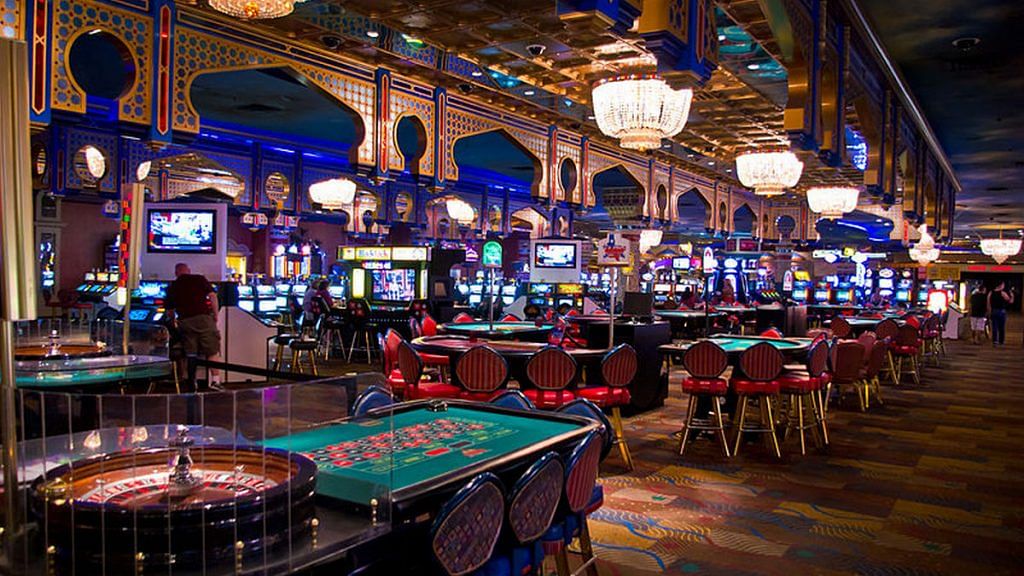
Gambling games have long been a staple in human culture, providing not just entertainment but a fascinating reflection of our dreams, ambitions, and concerns. From the rotating wheels of a slot machine to the tactical play of poker, these games encapsulate a spectrum of human emotions and incidents. Trang chủ F8BET At their core, casino games are more than a chance to earn cash; they are a microcosm of life itself, where danger and gain merge and fate can change in an instant.
As players convene around tables or sit in front of vibrantly illuminated machines, they participate in a ceremony that transcends mere betting. These games mirror our innate desires for relationships, thrill, and the pursuit of luck. They also unveil deeper truths about human behavior, such as our relationship with luck and the adrenaline of the unknown. In exploring casino games, we reveal not only the nuances of play but also the intricate pattern of the human story, showcasing our interconnected narratives of aspiration and reality.
The Psychology of Gambling
Wagering is deeply rooted in the psyche of individuals, appealing to various feelings and wants. The excitement of taking risks is a core aspect that draws players in, whether the excitement of spinning a roulette wheel or the anticipation of drawing a winning hand in poker. This rush of adrenaline is often compared to other forms of thrill, as the unpredictability of outcomes triggers a unique psychological response. Gamblers often find themselves entranced by the chance of striking it rich, leading to an almost magnetic draw toward gambling games.
Additionally, an essential component of the psychology behind gambling is the concept of optimism and aspiration. https://f8bet.co.com/tin-tuc-f8bet/ Players often indulge in dreams of financial freedom and the opulent lifestyle that can follow winning. This hope fuels their continued participation in casino games, as it provides a sense of meaning and the conviction that a life-changing win could be just one bet away. The narrative of beating the odds and finding success resonates with many, strengthening their commitment to play and engage with these games.
Lastly, social aspects play a crucial role in gambling psychology. Casino environments are designed to promote social interaction, where players gather to share the journey of wins and losses. This shared aspect not only amplifies enjoyment but also affects behavior, as individuals often imitate the actions of others in their vicinity. The social validation found in mutual thrill can enhance the emotional experience, making casino games a mirror of not just personal desires but also shared involvement within the gambling community.
### Risk and Reward: A Double-Edged Sword
Gambling activities embody the subtle balance between danger and reward that resonates profoundly with the human experience. The excitement of placing a bet is often accompanied by a rush of adrenaline, as participants are confronted with the possibility of striking it rich, yet conscious of the risk to suffer losses. This twofold experience reflects a essential aspect of life: the paths we choose often come with built-in risks, and the pursuit of reward can drive us to take chances we might not normally consider. In this way, gambling activities echo real-world decisions, enticing gamblers to gamble not just their capital, but also their hopes.
The allure of big prizes and payouts fuels a feeling of positivity, inspiring gamblers to dream of a more promising future that could manifest from a fortunate turn of the wheel or flip of a card. This optimism can compel individuals to engage in riskier behaviors, encouraging them to extend their limits in search of economic benefit. However, just as in life, the consequences of these risks can lead to both victory and despair. The narratives of both jackpot winners and those who have suffered everything at the casino demonstrate the unpredictable nature of chance and its consequential repercussions on our futures.
Ultimately, the experience of engaging with casino games serves as a strong reminder of the nature of humanity. Every game played is filled with the tension of uncertainty, as gamblers weigh the gains against the dangers. This balance not only highlights the excitement that comes with gambling but also reveals the risks that come with the longing for more. As we journey through the complexities of choice and consequence in both the gambling world and in life, we find that the quest for gain shapes our identities and lives in deep ways.
Culture and Isolation in Gambling Culture
Gambling environment is a special mix of social engagement and personal endeavor, reflecting the tensions of human experience. Players often come together around tables, sharing in the excitement of the game, rejoicing in wins, and sympathizing over losses. This social aspect is vital, as it creates a sense of belonging and camaraderie among diverse groups of individuals. Regular attendees to gaming establishments may form friendships and establish routines, turning the casino into a alternative home where they experience linked to a greater community of players.
However, the appeal of gambling activities can also result to isolation. As individuals become engrossed in the thrill of playing, they may isolate from personal connections or neglect to interact with the environment outside the gaming space. For some, the search of a windfall can distract from real relationships, leading to loneliness. The experience of being surrounded others yet feeling solitary is not rare, as the focus shifts from collective fun to the individual concerns of each individual’s journey.
This interplay of society and solitude creates a vivid mosaic that defines casino culture. It highlights the intricacy of human interactions, where happiness and sorrow coexist. Casinos serve as both a sanctuary for social engagement and a platform for individual struggles, demonstrating how deeply connected our yearning for connection and the personal quest for wealth can be. In navigating this landscape, players confront their own narratives—seeking both the rush of the game and the fellowship of fellow players, ultimately reflecting the wider spectrum of human experience.
